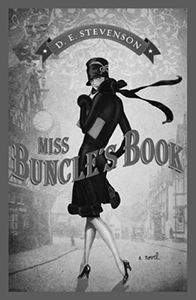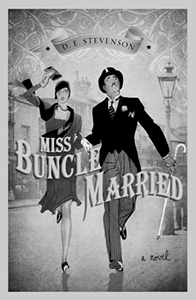The Two Mrs. Abbotts (23 page)
Read The Two Mrs. Abbotts Online
Authors: D. E. Stevenson

“Let's go and tell Jerry and Barbara,” said Archie, putting his hand through her arm.
“Yes, let's,” said Jane, smiling.
Read on for an excerpt from
Miss Buncle's Book
Available now from Sourcebooks Landmark
Breakfast Rolls
One fine summer's morning the sun peeped over the hills and looked down upon the valley of Silverstream. It was so early that there was really very little for him to see except the cows belonging to Twelve-Trees Farm in the meadows by the river. They were going slowly up to the farm to be milked. Their shadows were still quite black, weird, and ungainly, like pictures of prehistoric monsters moving over the lush grass. The farm stirred and a slow spiral of smoke rose from the kitchen chimney.
In the village of Silverstream (which lay further down the valley) the bakery woke up first, for there were the breakfast rolls to be made and baked. Mrs. Goldsmith saw to the details of the bakery herself and prided herself upon the punctuality of her deliveries. She bustled round, wakening her daughters with small ceremony, kneading the dough for the rolls, directing the stoking of the ovens, and listening with one ear for the arrival of Tommy Hobday who delivered the rolls to Silverstream before he went to school.
Tommy had been late once or twice lately; she had informed his mother that if he were late again she would have to find another boy. She did not think Tommy would be late again, but, if he were, she must try and find another boy, it was so important for the rolls to be out early. Colonel Weatherhead (retired) was one of her best customers and he was an early breakfaster. He lived in a gray stone house down near the bridgeâThe Bridge Houseâjust opposite to Mrs. Bold at Cozy Neuk. Mrs. Bold was a widow. She had nothing to drag her out of bed in the morning, and, therefore, like a sensible woman, she breakfasted late. It was inconvenient from the point of view of breakfast rolls that two such near neighbors should want their rolls at different hours. Then, at the other end of the village, there was the Vicar. Quite new, he was, and addicted to early services on the birthdays of Saints. Not only the usual Saints that everybody knew about, but all sorts of strange Saints that nobody in Silverstream had ever heard of before; so you never knew when the Vicarage would be early astir. In Mr. Dunn's time it used to slumber peacefully until its rolls arrived, but now, instead of being the last house on Tommy's list, it had to be moved up quite near the top. Very awkward it was, because that end of the village, where the old gray sixteenth-century church rested so peacefully among the tombstones, had been all late breakfasters and therefore safe to be left until the end of Tommy's round. Miss Buncle, at Tanglewood Cottage, for instance, had breakfast at nine o'clock, and old Mrs. Carter and the Bulmers were all late.
The hill was a problem too, for there were six houses on the hill and in them dwelt Mrs. Featherstone Hogg (there was a Mr. Featherstone Hogg too, of course, but he didn't count, nobody ever thought of him except as Mrs. Featherstone Hogg's husband) and Mrs. Greensleeves, and Mr. Snowdon and his two daughters, and two officers from the camp, Captain Sandeman and Major Shearer, and Mrs. Dick who took in gentlemen paying guests, all clamoring for their rolls earlyâexcept, of course, Mrs. Greensleeves, who breakfasted in bed about ten o'clock, if what Milly Spikes said could be believed.
Mrs. Goldsmith shoved her trays of neatly made rolls into the oven and turned down her sleeves thoughtfully. Now if only the Vicar lived on the hill, and Mrs. Greensleeves in the Vicarage, how much easier it would be! The whole of the hill would be early, and Church End would be all late. No need then to buy a bicycle for Tommy. As it was, something must be done, either a bicycle or an extra boyâand boys were such a nuisance.
Miss King and Miss Pretty dwelt in the High Street next door to Dr. Walker in an old house behind high stone walls. They had nine o'clock breakfast, of course, being ladies of leisure, but the rest of the High Street was early. Pursuing her previous thoughts, and slackening her activities a little, now that the rolls were safely in the oven, Mrs. Goldsmith moved the ladies into the Colonel's house by the bridge, and the gallant Colonel, with all his goods and chattels, was dumped into Durward Lodge next door to Dr. Walker.
These pleasant dreams were interrupted by the noisy entrance of Tommy and his baskets. No time for dreams now.
“Is this early enough for you?” he inquired. “Not ready yet? Dear me! I've been up for hours, I 'ave.”
“Less of your cheek, Tommy Hobday,” replied Mrs. Goldsmith firmly.
***
At this very moment an alarm clock started to vibrate furiously in Tanglewood Cottage. The clock was in the maid's bedroom, of course. Dorcas turned over sleepily and stretched out one hand to still its clamor. Drat the thing, she felt as if she had only just got into bed. How short the nights were! She sat up and swung her legs over the edge of the bed and rubbed her eyes. Her feet found a pair of ancient bedroom slippersâwhich had once belonged to Miss Buncleâand she was soon shuffling about the room and splashing her face in the small basin which stood in the corner in a three-corner-shaped washstand with a hole in the middle. Dorcas was so used to all this that she did it without properly waking up. In fact it was not until she had shuffled down to the kitchen, boiled the kettle over the gas ring, and made herself a pot of tea that she could be said to be properly awake. This was the best cup of the day and she lingered over it, feeling somewhat guilty at wasting the precious moments, but enjoying it all the more for that.
Dorcas had been at Tanglewood Cottage for more years than she cared to count; ever since Miss Buncle had been a small fat child in a basket-work pram. First of all she had been the small, fat child's nurse, and then her maid. Then Mrs. Buncle's parlor maid left and Dorcas had taken on the job; sometimes, in domestic upheavals, she had found herself in the role of cook. Time passed, and Mr. and Mrs. Buncle departed full of years to a better land and Dorcasâwho was now practically one of the familyâstayed on with Miss Buncleâno longer a fat childâas cook, maid, and parlor maid combined. She was now a small, wizened old woman with bright beady eyes, but in spite of her advancing years she was strong and able for more work than many a young girl in her teens.
“Lawks!” she exclaimed suddenly, looking up at the clock. “Look at the time, and the drawing-room to be done yetâI'm all behind, like a cow's tail.”
She whisked the tea things into the sink and bustled round the kitchen putting things to rights, then, seizing the broom and the dusters out of the housemaid's cupboards, she rushed into Miss Buncle's drawing-room like a small but extremely violent tornado.
Breakfast was all ready on the dining-room table when Miss Buncle came down at nine o'clock precisely. The rolls had come, and the postman was handing in the letters at the front door. Miss Buncle pounced upon the letters eagerly; most of them were circulars but there was one long thin envelope with a London postmark addressed to “John Smith, Esq.” Miss Buncle had been expecting a communication for John Smith for several weeks, but now that it had come she was almost afraid to open it. She turned it over in her hands waiting until Dorcas had finished fussing round the breakfast table.
Dorcas was interested in the letter, but she realized that Miss Buncle was waiting for her to depart, so at last she departed reluctantly. Miss Buncle tore it open and spread it out. Her hands were shaking so that she could scarcely read it.
ABBOTT & SPICER
Publishers
Brummel Street,
London EC4
âth July.
Dear Mr. Smith,
I have read
Chronicles of an English Village
and am interested in it. Could you call at my office on Wednesday morning at twelve o'clock? If this is not convenient to you I should be glad if you will suggest a suitable day.
Yours faithfully,
A. Abbott
“Goodness!” exclaimed Miss Buncle aloud. “They are going to take it.”
She rushed into the kitchen to tell Dorcas the amazing news.
Miss Buncle's Book
D. E. Stevenson

Who knew one book could cause so much chaos?
Barbara Buncle is in a bind. Times are harsh, and Barbara's bank account has seen better days. Maybe she could sell a novelâ¦if she knew any stories. Stumped for ideas, Barbara draws inspiration from her fellow residents of Silverstream, the little English village she knows inside and out.
To her surprise, the novel is a smash. It's a good thing she wrote under a pseudonym, because the folks of Silverstream are in an uproar. But what really turns Miss Buncle's world around is this: what happens to the characters in her book starts happening to their real-life counterparts. Does life really imitate art?
A beloved author who has sold more than seven million books, D. E. Stevenson is at her best with
Miss Buncle's Book
, crafting a highly original and charming tale about what happens when people see themselves through someone else's eyes.
Praise for
Miss Buncle's Book
:
“Love it, love it, love it! There are no vampires, no faeries, no weird creatures, just a sweet story about real people living in a world I've always dream of.” â
Reader Review
For more D. E. Stevenson books, visit:
Miss Buncle Married
D. E. Stevenson

A marriage and a sudden move to a new town won't slow this mischievous writer down!
Barbara Buncle: bestselling novelist, new wifeâ¦new neighbor? In this charming follow-up to
Miss Buncle's Book
, the intrepid writer moves to a new town filled with fascinating folksâ¦who don't even know they might become the subjects of her next bestselling book.
Miss Buncle may have settled down, but she has already discovered that married life can't do a thing to prevent her from getting into humorous mix-ups and hilarious hijinks.
A beloved author who has sold more than seven million books, D. E. Stevenson is at her best with the stories of Miss Buncle.
Praise for
Miss Buncle Married
:
“Completely charming and funny, in a way that's intelligent without being difficult, and cozy without turning sticky-sweet.” â
Reader Review
For more D. E. Stevenson books, visit:
D. E. Stevenson (1892â1973) had an enormously successful writing career: between 1923 and 1970, four million copies of her books were sold in Britain and three million in the States. Her books include
Miss
Buncle's Book
,
Miss
Buncle
Married
,
The
Young
Clementina
,
The
Listening
Valley
,
The
Two
Mrs. Abbotts
, and
The
Four
Graces
. D. E. Stevenson was born in Edinburgh in 1892; she lived in Scotland all her life. She wrote her first book in 1923, but her second did not appear for nine years. She published
The
Two
Mrs. Abbotts
in 1943.
